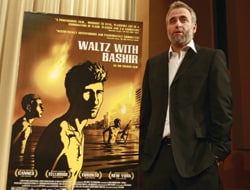
Waltz with Bashir
Starring: Ron Ben-Yishai, Ronny Dayag, Ari Folman, Dror Harazi, Yehezkel Laz
Can’t films be therapeutic? Director-protagonist Ari Folman asks Ori (his film-making partner and friend) within the first five minutes of Waltz with Bashir. I don’t recall if he ever gets an answer. Waltz is a foreign-language animated film. But one with very little resemblance to Snow White; a surreal painting crossed with a graphic war novel is much closer. An aid to further understanding of the psychic damage of war is even closer.
Folman fought in the 1982 Lebanon war as a 19-year old. In 2006, he meets an old comrade, Boaz Rein, who has been having nightmares about the war. Folman realises that he remembers nothing about the war, least of all the massacre at the Lebanese cities of Sabra and Shatila, where he played a part. He sets out to talk to old friends who have their own versions of the same time. He meets Carmi, who had the brains to be nuclear physicist, but now lives in Holland smoking joints; his former commander has taken up martial arts; a third comrade still hasn’t recovered from the trauma.
People and their memories are separate entities that fight each other as they try to figure out the truth. From the first scene—a pack of rabid, slavering mongrels—to the last, the film chomps down on your mind, clenches its jaws and refuses to let go. Waltz distorts animation. The yellow colour of war dominates most of the film; sequences get progressively more bizarre as soldiers’ ‘memories’ try to remember the horrors of war.
The language is Hebrew, the soldiers are Israeli, the victims are Lebanese but the horror is universal. Waltz clambers all over you, suffocates you and forces you to look. It will affect anyone with suppressed demons; who doesn’t have some? It makes you want to dredge them up again just to feel the pain. Minimalist electronic artist Max Richter composed the original score for Waltz and Folman intertwines classical music with electronica to whip the movie along. The demented waltz sequence that gives the movie its title makes you wonder why the survivors are still sane.
It came as no surprise when Waltz won the Golden Globe for the best foreign language film.
In an interview to the New York Times , Folman said the film will always be up-to-date because “something will always happen again.”
With conflicts raging from Zimbabwe to Thailand to India to the Middle East, Waltz perhaps tells us that it is better to come out and face the truth rather than locking away our darkest times.
There is actual footage at the end of the movie where Lebanese women cry out, “Where are the Arabs?” as they mourn the deaths of their men.
Flash forward to 2009 and you have Palestinians asking the same questions again.





